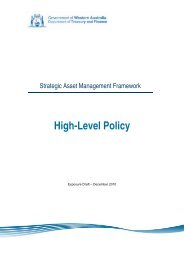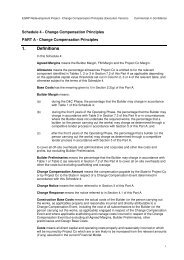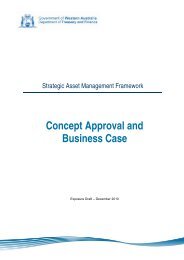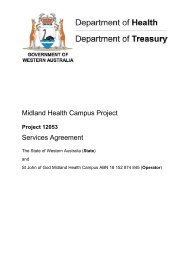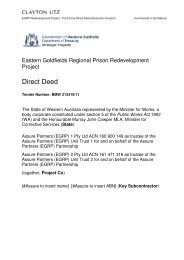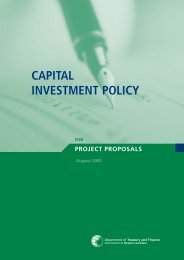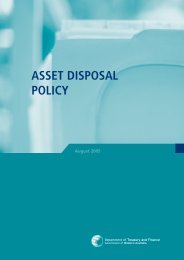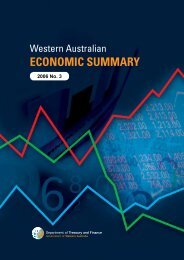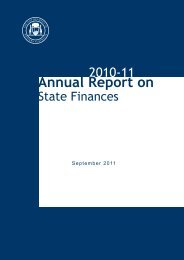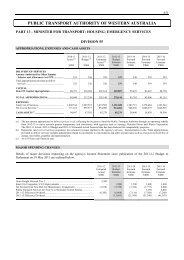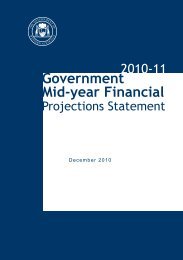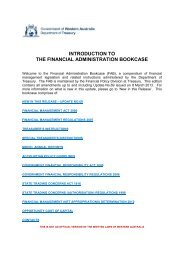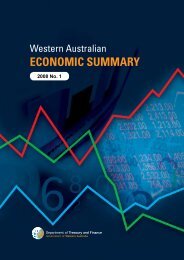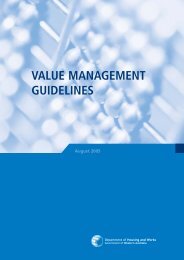Garnaut Fitzgerald Review of Commonwealth-State Funding
Garnaut Fitzgerald Review of Commonwealth-State Funding
Garnaut Fitzgerald Review of Commonwealth-State Funding
Create successful ePaper yourself
Turn your PDF publications into a flip-book with our unique Google optimized e-Paper software.
CHAPTER 10: Efficiency and Economic Growth<br />
The New Zealand Business Roundtable commissioned a report on Tasmania’s<br />
economic performance in the last decade and the lessons to be learned for New<br />
Zealand. It describes the Tasmanian economy as:<br />
a cause for considerable concern not only for those Australians who happen to<br />
live there but also to those in the rest <strong>of</strong> the country who are called to<br />
underwrite the <strong>State</strong>’s living standards (Rae 2002).<br />
The <strong>State</strong>’s poor economic performance is mainly attributed to poor policy decisions,<br />
including Government inaction in adopting recommendations to relieve adverse impacts<br />
<strong>of</strong> its anti-business and narrow-base taxation regime. Tasmanian policy has been<br />
greatly influenced by <strong>Commonwealth</strong> transfers over the decades, and, most strongly, in<br />
recent years. Under current arrangements, improved economic performance would not<br />
increase the fiscal resources available for use in the <strong>State</strong>. In the future, higher levels <strong>of</strong><br />
successful, growth-promoting public investment may lead to less – not more – <strong>State</strong><br />
Government funds being available for other activities.<br />
The fact that recipient <strong>State</strong>s have much smaller proportions <strong>of</strong> the population receiving<br />
their employment and incomes in the private sector than the donor <strong>State</strong>s seems likely,<br />
over time, to influence the political economy <strong>of</strong> policy unfavourably for economic<br />
development.<br />
10.6 Other aspects <strong>of</strong> efficiency<br />
Overheads<br />
In any system, an unambiguous source <strong>of</strong> inefficiency is the overhead cost <strong>of</strong> running<br />
the system.<br />
In the case <strong>of</strong> HFE, costs include the running <strong>of</strong> the CGC and the <strong>State</strong> bureaucracies<br />
that serve and seek to persuade the CGC. These costs may total around $10 million per<br />
year, reflecting the extraordinarily detailed and administratively cumbersome nature <strong>of</strong><br />
the process. Many <strong>of</strong> the most talented <strong>of</strong>ficers in the <strong>State</strong> public services are engaged<br />
in the task <strong>of</strong> marshalling evidence to maximise their <strong>State</strong>s’ expenditure disabilities,<br />
minimise their revenue disabilities and criticise other jurisdictions’ arguments.<br />
Less transparent, and larger, are the overhead costs <strong>of</strong> the 120 SPPs. In a recent audit<br />
<strong>of</strong> seventy-one SPPs, the Australian National Audit Office (1999, p. 136) estimated the<br />
cost <strong>of</strong> administering these to be $68.8 million (over 550 full-time staff) for the<br />
<strong>Commonwealth</strong> alone. The Australian National Audit Office also stated that the<br />
<strong>Commonwealth</strong> funded $77 million <strong>of</strong> <strong>State</strong>/Territory administration costs. This would be<br />
only part <strong>of</strong> the administration costs borne by the <strong>State</strong>s. There is continuous negotiation<br />
over conditions, funding levels, guidelines, boundaries, administration, performance,<br />
reporting and accountabilities. Governments also need substantial administrative<br />
apparatus to provide information and policy expertise to support these negotiations.<br />
Administrative apparatus is also needed to support agreements on these issues and<br />
provide reports.<br />
FINAL REPORT [146]



